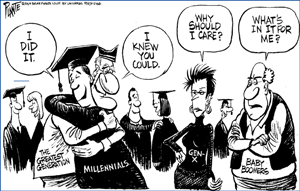 Generation Y has been called many names: “Millennials”, “The Me Me Me Generation”, “Peter Pan generation”, “Generation WE”, and “The Boomerang Generation.” Most people who are not Millennials generally have few, if any, complimentary things to say about this cohort. However, research we conducted reveals that many beliefs about Millennial employees – that they are only motivated by money and rewards, or as a CBS report put it, are “narcissistic praise hounds” – may be untrue.
Generation Y has been called many names: “Millennials”, “The Me Me Me Generation”, “Peter Pan generation”, “Generation WE”, and “The Boomerang Generation.” Most people who are not Millennials generally have few, if any, complimentary things to say about this cohort. However, research we conducted reveals that many beliefs about Millennial employees – that they are only motivated by money and rewards, or as a CBS report put it, are “narcissistic praise hounds” – may be untrue.
I know anecdotal evidence is not enough to defend the integrity of the Millennials, so I’m going to provide hard data. However, with a lot of kids from this generation in my family, I can offer these observations:
- They are incredibly tech-savvy. My brother took about 3 ½ minutes to set up my new Samsung Tablet - which he bought for me – with everything I could possibly need. Sure, he texted me when he was done (even though he was one floor above me), but I’ll have you know he didn’t use ridiculously cryptic abbreviations. My brother believes in proper spelling and grammar when he texts someone.
- They are incredibly determined. Ok – so my cousin went from wanting to be a police officer, to a personal trainer, to a gym teacher. My brother went from wanting to be an accountant (he is an absolute number whiz) to an English teacher. My point is, while they do change their mind pretty often, once they are truly settled on a goal, they won’t stop working until they achieve it.
- They are very open-minded. Most Millennials don’t care about a person’s sexual orientation, nationality, or skin color. Many, especially those in urban areas, have been so exposed to diversity that they grew up not paying much attention to such things. Ready and ever-present access to information and a variety of opinions on a variety of topics has expanded their horizons.
- They stand against injustice. Millennials tend to believe in equality and care about the environment. They have been encouraged at school and at home to volunteer and become involved in various causes. Social media serves both as a vehicle for good peer pressure to get involved, and a platform to showcase what they believe in.

Not convinced yet of the merits of this generation? Here are some cold, hard facts. Using data from our CAMOP (Career Motivation Profile), we attempted to uncover how Millennials, Gen Xers, and Baby Boomers differ in terms of motivators; essentially, what makes them want to work hard.
The three cohorts share several strong motivators – learning, creativity, and altruism. The score differences on these intrinsic motivators are not statistically significant – meaning Boomers, Gen Xers, and Millennials have almost the same scores, and all above 70.
However, there are many motivators where these generations do differ significantly, and often, the differences in average scores are profound: (Note: Scores range from 0 to 100; the higher the score, the more inspiring and important the motivator).
- Achievement: Desire to set and reach major goals and rise up to challenges at work, likemaking a big sale, leading a team, or designing an innovative product.
- Contribution: Desire to contribute something major to a field: inventing something new, making an important discovery, or advancing technology. Typically, individuals who are motivated by Contribution value education, training and experience; they are quite dedicated to their work.
- Mobility: Desire to see and experience new places. Individuals with this motivator are curious, open-minded, have a thirst for adventure, and are highly adaptable.
- Recognition and Appreciation: Desire to feel valued for one’s hard work. This doesn’t necessarily imply public recognition but rather, involves acknowledgement at a root-level of the organization;people with this motivator want encouragement from their boss. They are driven by the positive feelings they get from the knowledge that they are making a valuable contribution to the company.
- Socializing: Desire to work with others; to be a part of a team, group, or community. People with this motivator like sharing their thoughts and are generally strong communicators; they often choose a career based on its “human” element.
- Status: Desire to achieve a high social standing at work in order to impress others. It’s important to point out that individuals with this motivator take pride in their achievements and will work hard to stay on top. They are strong competitors who always “keep their eyes on the prize.”
- Fun and Enjoyment: For those with this motivator, what they are doing in life is not as important as whether they enjoy doing it. This doesn’t mean that they are not going to work hard; rather, it indicates that they want to work in a position where fun and hard work can coexist happily. They want a position that is well-suited to their interests. This may be the reason why many college-bound teenagers keep changing their mind about their chosen major.
Here’s the reality: Each generation has certain stereotypes, a convenient fact that many people forget. For example, a 2009 paper by Crampton & Hodge in the Journal of Business Economics Research reveals that Baby Boomers were taught to be respectful of authority, but also had the tendency to challenge the system, creating the anti-establishment attitude of that generation. They were also viewed by theorists as micro-managers, and mercilessly determined to achieve material success, whatever the cost. Does this mean that every Baby Boomer should be painted with the same brush – as a ruthless, rebellious, and money-hungry achiever? Absolutely not. So we need to allow Millennials the chance to prove themselves in the workplace, and not allow stereotypes to color our judgment.
There is a kernel of truth in the stereotypes that the older generations hold about Generation Y. There is the need for instant gratification and recognition. Work-life balance and flexibility are important to them, which may present a problem in some companies. There is the impatience, short attention span, and the sense of entitlement. However, a big part of that is a lack of understanding of how the new generation functions.
Millennials also have a lot going for them – they are well connected and are trained – to a fault sometimes – to juggle many things at once. They are achievement oriented; they want to succeed, to make a difference, to stand out. In fact, due to constant comparisons with their peers on social media sites, they are very driven and put a lot of pressure on themselves. They adapt quickly, are skilled at research, and tend to be excellent team players due to a major shift to group work in the education system.
The bottom line is that Millennials are here to stay, and like it or not, every company will need to hire workers from that generation. Sure, you will find some difficult ones, but there are many gems among them as well. Like with anybody else, you need to understand Millennials in order to help them perform at their best. And you can make it work if you look at each of them as individuals, and figure out what motivates and de-motivates them.
If you’re interested in using CAMOP (Career Motivation Profile) or other tests for HR purposes, request a free trial for ARCH Profile here.
Want to learn more about using psychological tests for hiring, leadership development, career development or talent retention? Download our free eBook loaded with down-to-earth information about psychological testing for HR purposes.

